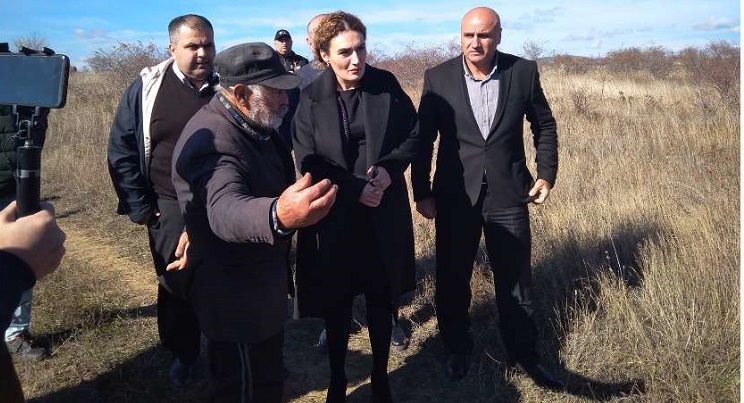Reconciliation minister on new barbed wire fences: Russians are isolating occupied Tskhinvali

Georgian Minister of Reconciliation and Civil Equality Ketevan Tsikhelashvili came to the village today where Russia has erected new barbed wire fences. Photo: Imedi TV.
Georgian Minister of Reconciliation and Civil Equality Ketevan Tsikhelashvili has come to the Atotsi village of Kareli municipality today, where occupants are erecting new barbed wire fences and stated that through this step, Russia is isolating the Tskhinvali region from the outside world and is creating “unbearable” conditions for ethnic Ossetians.
80-90 per cent of the population who face serious problems due to the barbed wire fences live in the occupied Tskhinvali region, mainly they are ethnic Ossetians, who need to move freely and are deprived of the right. The barbed wire fences are one piece of evidence showing how insignificant human rights and interests are to the occupants.
Georgians, the Abkhaz or Ossetians carry no interest for them, they just act based on their strategic and political interests,” Tsikhelashvili said, responding to the erection of new barbed wire fences by occupants at the village of Atsotsi, near breakaway Tskhinvali.
Tsikhelashvili said that the central Georgian government is using all available levers to respond to the illegality.
We have activated the hot line and are communicating with all our partners regarding the issue. We are communicating with Russia as well,” Tsikhelashvili said.
She said that the erection of the new wire fences could have been related to the election period in Georgia, “for Russians to exercise further pressure on the Georgian government and people.”
Tsikhelashvili said that the government of Georgia will continue its “peaceful fight” until all the barbed wire fences are destroyed on its territory.
She announced increased financial support for Georgian citizens who live in the villages near occupation lines, which will include 200 GEL vouchers in winter for gas and electricity and full coverage of university fees for students from such areas.
She stated that the government fully financed the studies of around 1,200 of such students over the course of the past four years.
 Tweet
Tweet  Share
Share